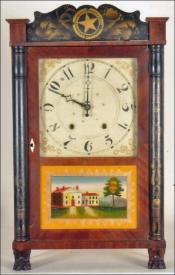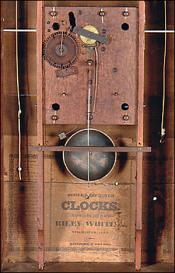Riley Whiting of Winchester, Connecticut. A transitional shelf clock.
This is a wonderful transitional shelf clock with pasted label by Riley Whiting of Winchester, Connecticut.
Riley Whiting served his apprenticeship with the Hoadleys in Plymouth, Connecticut making wooden geared clocks. In 1807, Riley, Samuel and Luther Hoadley formed a partnership and began building short and long pendulum clocks. Luther Hoadley died in 1813 and about the same time, Samuel entered the U. S. Army. This left Riley in business all by himself. He continued as sole proprietor until he died in 1835. During this later period, Riley is thought to have perfected the eight-day wooden geared movement.
This is a very colorful example which happens to be in outstanding original condition. This clock has the traditionally formatted thirty hour time and strike wooden geared movement. The original Clockmaker's label is pasted inside the case on the backboard. It lists the Maker and his working location. It is in very good original condition. The wooden dial is decorated in the four spandrel areas with raised gesso scroll work that is highlighted in gilt paint. Wonderfully turned and stenciled columns flank the sides of the case. The detail of which is very strong. The upper splat is also wonderfully stenciled. This clock stands on it's original carved paw feet. The lower section of the door is fitted with a decorative painted tablet. This tablet is original to this clock and is in excellent original condition retaining vibrant coloring. The scene depicts a large Connecticut residence. This mahogany case retains an older finish. It measures approximately 29.5 inches tall, 16.5 inches wide and 6 inches deep. It was made circa 1830.
Inventory number QQ-59.
Riley Whiting was born in Torrington, Connecticut, on January 16, 1785, the son of Christopher and Mary (Wilcox) Whiting. In 1806, he married Urania Hoadley and served his apprenticeship with her brothers Samuel and Luther Jr Hoadley. They had who had settled in Winchester, Connecticut, in 1803 and were making wooden geared clocks. In 1807, they formed a partnership under the name Samuel Hoadley & Co. Luther Hoadley was killed in Groton, Connecticut, in 1813, fighting in the war. Soon after that, Samuel and Riley changed the name to Hoadly & Whiting. In 1819, Samuel Hoadley sold his share of the business to Riley and continued to make clocks under his name. He also moved the company to the town of Winsted, a location along the Naugatuck River. Riley died there in 1835. It is interesting to note that very few clocks that the two previous firms made are known. Because they were not known to have signed their clocks, Riley changed that practice when he formed his own company. The dials of his tall clocks are boldly signed across the middle. His early production consisted of tall case movements, dials, weights, and pendulums. It is thought that he began to manufacture shelf clock movements in about 1828. During this later period, Riley is thought to have perfected the eight-day wooden geared movement. After his death, his widow and 15-year-old son Riley Jr. continued a limited operation until 1841, when they sold out to William L. Gilbert Co. in Winstead.






